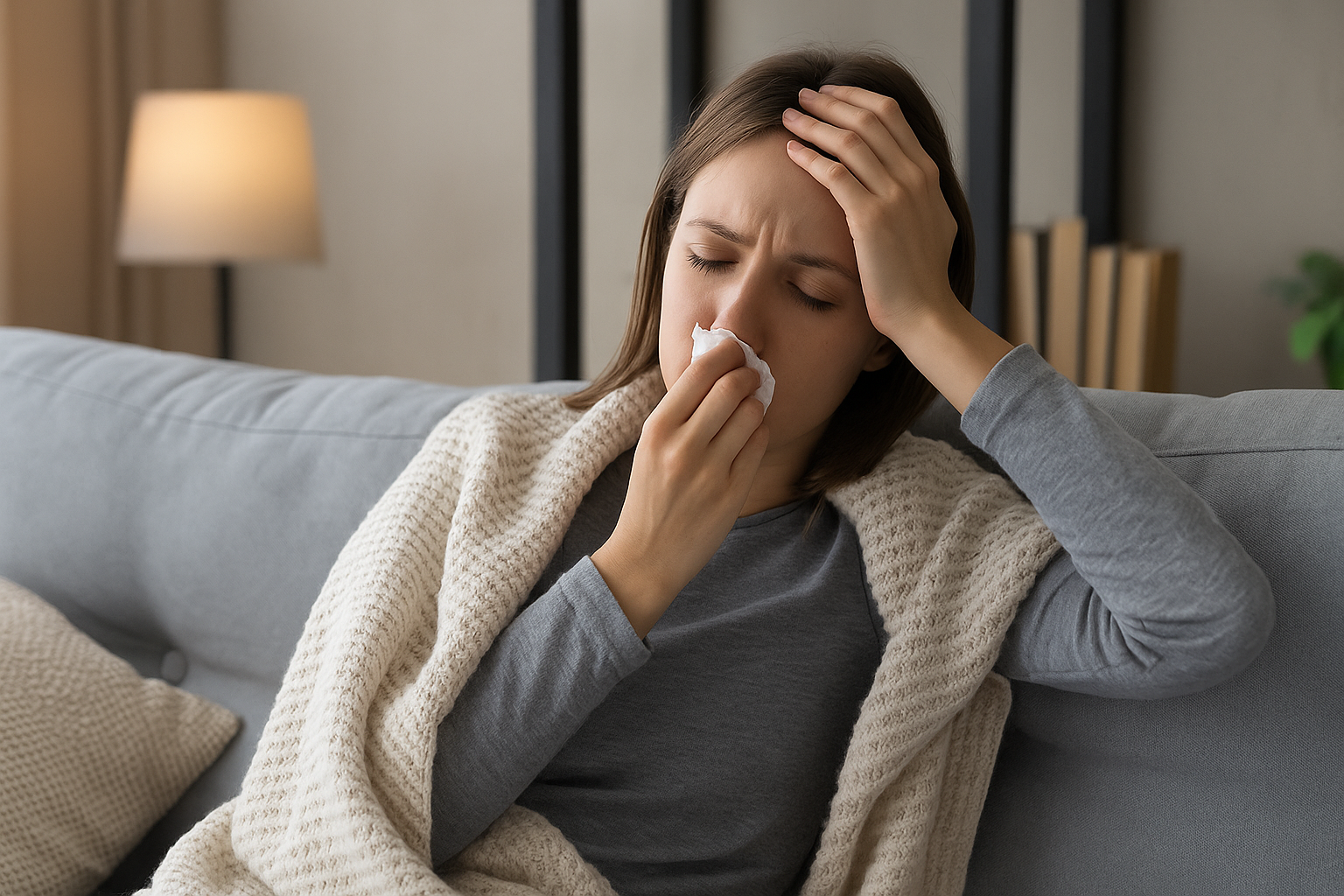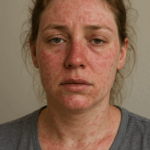At Askdoctor.ai, we understand that dealing with the symptoms of Mononucleosis (Mono), especially the overwhelming fatigue caused by the Epstein-Barr virus (EBV), can be both frustrating and exhausting. It can disrupt your daily life and leave you feeling powerless. That’s why we’ve created this content—to provide you with reliable, evidence-based information about Mono, its connection to EBV, and how you can manage your recovery more effectively. Our goal is to empower you with knowledge, practical tips, and recovery strategies so you can regain your strength and improve your quality of life.
Mononucleosis, often called “Mono,” is a viral infection that can make even everyday tasks feel exhausting. It’s most often caused by the Epstein-Barr virus (EBV), a member of the herpesvirus family. While Mono is not usually life-threatening, its symptoms—especially severe fatigue—can have a major impact on your quality of life.
According to the Centers for Disease Control and Prevention (CDC), 90–95% of adults worldwide have been infected with EBV by the time they reach their 40s. Yet not everyone experiences symptoms. Mono typically shows up during adolescence or early adulthood and can leave you feeling under of weather for weeks or months.
Understanding the EBV connection, the symptoms of Mono, and how to recover properly is essential for getting your health back on track.
Symptoms & Causes of Mononucleosis
Mono is primarily spread through saliva, which is why it’s sometimes called the “kissing disease.” But it can also spread through other bodily fluids like blood and semen, making transmission possible through sharing drinks, food utensils, or close contact like coughing or sneezing.
Common Symptoms
- Extreme fatigue – Often the most persistent and frustrating symptom, lasting weeks or even months.
- Low-grade fever – Typically mild but can linger over time.
- Sore throat – Frequently mistaken for strep due to severity and white patches.
- Swollen lymph nodes – Most noticeable in the neck and underarms.
- Headaches and muscle aches – General body discomfort and tension.
- Enlarged spleen or liver – Affects nearly 50% of mono cases, according to the Mayo Clinic.
- Skin rash – Less common but can develop, especially after antibiotic use.
- Night sweats and loss of appetite – Often contribute to overall weakness and discomfort.
Symptoms typically appear 4 to 6 weeks after exposure to the virus. While some people bounce back within a few weeks, others may struggle with fatigue for months.
The EBV Connection: Why It Causes Long-Lasting Fatigue
The Epstein-Barr virus is one of the most common human viruses and belongs to the herpes family. Once EBV infects you, it remains dormant in your body for life, occasionally reactivating. In some people, this results in Mononucleosis, especially when exposed during their teens or early adulthood.
How EBV Leads to Exhaustion
The fatigue caused by Mono isn’t your average tiredness—it’s a deep, ongoing exhaustion that doesn’t improve much with sleep. Studies suggest that about 10–13% of people develop post-viral fatigue lasting more than six months.
Some key reasons for this include:
- Immune System Overload: EBV activates the immune response heavily, which depletes your body’s energy reserves.
- Inflammation: Internal inflammation of the liver or spleen drains energy and prolongs fatigue.
- Sleep Disruption: Sore throat, fevers, and night sweats prevent restful sleep.
- Cytokine Imbalance: EBV alters the balance of immune system chemicals that regulate energy levels.
Even after your other symptoms improve, this persistent tiredness can remain and disrupt school, work, or daily life for months.
Treatment Options for Mononucleosis (Mono)
There’s no medication that cures Mono directly. Instead, the goal is to manage symptoms and support your immune system through recovery.
Conventional Treatments
- Plenty of Rest: This is the most effective “treatment.” You may need to rest for 2–6 weeks, depending on the severity of your symptoms.
- Hydration: Drink water, clear soups, and electrolyte-rich fluids to prevent dehydration.
- Pain and Fever Relievers: Over-the-counter medications like acetaminophen or ibuprofen can help reduce pain and control fever. Avoid aspirin in teens or children due to the risk of Reye’s syndrome.
- Corticosteroids (if needed): In rare cases of airway obstruction due to swollen tonsils or lymph nodes, a doctor may prescribe a short course of steroids.
Alternative & Natural Therapies
- Immune-Supporting Nutrients: Vitamin C, Vitamin D, and zinc have been shown to support immune defense. A study from the Journal of Clinical Medicine highlights the immune benefits of these nutrients.
- Herbal Support: Some people use elderberry, astragalus, or echinacea to help support their immune system. Always check with a healthcare provider before starting supplements.
- Soothing Remedies: Warm salt water gargles and honey-lemon teas can help with sore throat symptoms.
While alternative options can’t cure the virus, they may help your body recover more efficiently and reduce symptom intensity.
Lifestyle Adjustments & Recovery Tips
Recovering from Mononucleosis isn’t a one-size-fits-all journey. What works for one person may not work for another, but here are some evidence-based and practical tips that can help:
1. Respect the Need for Rest
Give your body permission to fully rest. Fatigue isn’t weakness—it’s your body healing. Avoid mentally and physically demanding tasks during the acute phase of Mono. Sleep as much as needed and let your body set the pace.
2. Ease Into Physical Activity
After symptoms subside, start with gentle movements like stretching or short walks. Avoid intense exercise until your doctor confirms your spleen is no longer enlarged.
A ruptured spleen, although rare, is a medical emergency and most likely to happen within the first 21 days of illness, per the Cleveland Clinic.
3. Eat Nutrient-Rich Foods
Focus on easy-to-digest, whole foods:
- Protein: Helps with tissue repair.
- Leafy Greens: Provide essential vitamins and minerals.
- Smoothies and Soups: Great for sore throats and reduced appetite.
Avoid processed foods and excessive sugar, which can impair immune function.
4. Pace Yourself
Once you begin feeling better, resist the urge to “make up for lost time.” Fatigue may still linger. Overdoing it can lead to relapse or prolonged recovery.
5. Monitor Emotional Health
Mono recovery can be isolating. About 30% of individuals experience symptoms of depression or anxiety during recovery, especially if fatigue is prolonged. Stay connected to friends or join online support communities for encouragement.
Real-Life Recovery Stories
“MONONUCLEOSIS – MY STORY”: A Personal Journey to Recovery
In this insightful video, the creator shares their personal experience with mononucleosis (Mono), detailing the severe symptoms they faced, including extreme fatigue, swollen lymph nodes, and a sore throat. The video provides a raw and relatable account of the emotional and physical toll of the illness, as well as the steps they took to recover. It emphasizes the importance of rest and mental resilience throughout the healing process, offering hope to anyone struggling with Mono.
Watch the video here: MONONUCLEOSIS – MY STORY
“My Recovery Story”: Overcoming Mono One Step at a Time
In this heartfelt Reddit post, a user shares their experience of battling mononucleosis. They describe the debilitating symptoms, including intense fatigue and loss of appetite, which made it difficult to complete daily tasks. Over time, they learned the importance of pacing themselves, resting, and prioritizing self-care. The post offers encouragement and practical advice for others facing the same struggle, stressing that patience and time are key to a full recovery.
Read the full post here: My Recovery Story
FAQs About Mononucleosis
- How long does Mono last?
The acute illness typically lasts 2–4 weeks. However, fatigue can stretch out to 6 weeks or longer in many individuals, depending on their immune response and overall health. - Is Mono contagious?
Yes. EBV can stay in your saliva for up to 18 months after the infection, according to the CDC. That’s why you should avoid sharing drinks or utensils even after you feel better. - Can I get Mono more than once?
Most people only get Mono once. EBV stays in the body for life, but it usually doesn’t cause symptoms again. In rare cases, it may reactivate in people with weakened immune systems. - How is Mono diagnosed?
Doctors typically run a physical exam and blood tests. The monospot test and EBV antibody test are commonly used to confirm the diagnosis. - Is there a vaccine for EBV or Mono?
Not yet, but research is underway. According to NIH-funded studies, EBV vaccine trials are showing promise in preventing the development of mononucleosis in the future.
Final Thoughts on Recovering from Mononucleosis
Mononucleosis, driven by the Epstein-Barr virus, can turn your world upside down for a while, but recovery is possible. While the fatigue may test your patience, it’s part of your body’s natural healing process. By focusing on rest, good nutrition, hydration, and emotional well-being, you can support your recovery and get back to feeling like yourself again. If symptoms linger or worsen, talk to a healthcare provider to rule out any complications.
Have you or someone you know experienced Mono and recovered successfully? Share your recovery tips or story below—your experience might give someone else the encouragement they need to heal.
References:
Centers for Disease Control and Prevention (CDC)
Mayo Clinic
National Institutes of Health (NIH)
Journal of Clinical Medicine
Cleveland Clinic









Leave a Reply